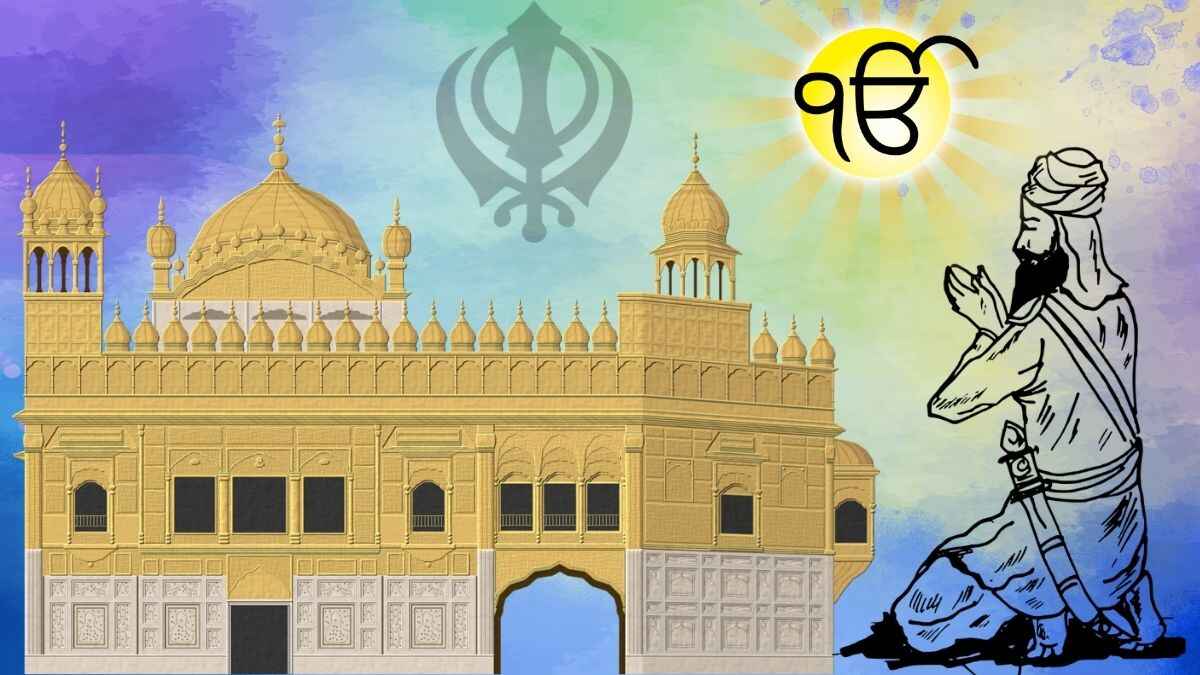What is Sikhism? Sikhism Explained- Beliefs, Practices, and History
Sikhism is a monotheistic religion founded in the late 15th century in Punjab, India. It emphasizes equality, service, and devotion to God while rejecting caste and ritualism. Today, Sikhism is the fifth-largest religion globally, with over 25 million adherents.
Origins of Sikhism
Sikhism was established by Guru Nanak Dev Ji (1469–1539), the first of ten Sikh Gurus. Born in the village of Talwandi (now Nankana Sahib, Pakistan), Guru Nanak rejected the rigid rituals and social inequalities of the time, advocating instead for a direct connection with the divine. His teachings, expressed through hymns, form the foundation of Sikhism.
The Sikh faith developed over two centuries under the guidance of nine subsequent Gurus, culminating with the Guru Granth Sahib, the Sikh holy scripture, declared the eternal Guru in 1708.
Core Beliefs of Sikhism
Monotheism and Divine Unity – Sikhs believe in one God, referred to as Waheguru, the Supreme Being. Waheguru is formless, timeless, and omnipresent, and Sikhs strive for union with this divine entity through meditation and righteous living.
Equality and Justice – Equality is a cornerstone of Sikhism. The faith rejects caste, gender, and class discrimination, emphasizing the inherent dignity of all individuals.
- Langar: Community kitchens serve free meals to all, symbolizing equality and service.
- Seva (Selfless Service): Sikhs are encouraged to contribute to the well-being of others without expecting anything in return.
Earning an Honest Living -Sikhs are urged to engage in honest labor (Kirat Karni) to sustain themselves and their families while sharing their earnings with those in need (Vand Chakna).
Devotion and Meditation Meditating on God’s name (Naam Japna) is central to Sikh practice. Through remembrance and recitation, Sikhs seek spiritual enlightenment and inner peace.
Key Practices in Sikhism
The Five Ks
Initiated Sikhs, known as Khalsa, adhere to five articles of faith, collectively called the Five Ks:
- Kesh: Uncut hair, representing acceptance of God’s will.
- Kanga: A wooden comb, symbolizing cleanliness and order.
- Kara: A steel bracelet, signifying unity and eternity.
- Kachera: Cotton undergarments, representing self-discipline and modesty.
- Kirpan: A ceremonial sword, symbolizing justice and protection of the oppressed.
The Gurdwara
A Gurdwara is a Sikh place of worship where community members gather to pray, meditate, and partake in Langar. The most renowned is the Golden Temple (Harmandir Sahib) in Amritsar, Punjab.
The Guru Granth Sahib
The Guru Granth Sahib is the central religious scripture of Sikhism, composed of hymns by Sikh Gurus and other saints. It serves as the spiritual guide for Sikhs, with its teachings emphasizing devotion, morality, and equality.
Historical Development of Sikhism
The Ten Gurus
- Guru Nanak Dev Ji (1469–1539): Founder of Sikhism, emphasizing divine unity and equality.
- Guru Angad Dev Ji (1504–1552): Standardized the Gurmukhi script for Sikh writings.
- Guru Amar Das Ji (1479–1574): Advocated gender equality and established the Langar tradition.
- Guru Ram Das Ji (1534–1581): Founded the city of Amritsar.
- Guru Arjan Dev Ji (1563–1606): Compiled the Adi Granth, the precursor to the Guru Granth Sahib.
- Guru Hargobind Ji (1595–1644): Introduced the concept of Miri-Piri (spiritual and temporal leadership).
- Guru Har Rai Ji (1630–1661): Promoted environmental conservation and healing.
- Guru Har Krishan Ji (1656–1664): Known for his compassion, particularly during a smallpox epidemic.
- Guru Tegh Bahadur Ji (1621–1675): Sacrificed his life to protect religious freedom.
- Guru Gobind Singh Ji (1666–1708): Established the Khalsa and finalized the Guru Granth Sahib.
Modern Sikhism and Global Presence
Diaspora and Global Influence
Sikhs have a significant presence worldwide, especially in countries like Canada, the United States, the United Kingdom, and Australia. The Sikh diaspora actively contributes to local economies while maintaining strong cultural and religious ties.
Social and Humanitarian Efforts
Sikhs are renowned for their humanitarian efforts, including disaster relief, food distribution, and advocacy for social justice. Initiatives like Khalsa Aid exemplify the Sikh principle of Seva on a global scale.
Sikhism’s Relevance in Contemporary Society
Sikhism’s principles of equality, service, and justice resonate strongly in today’s world. As societies grapple with issues like inequality, religious intolerance, and environmental degradation, the teachings of Sikhism offer timeless guidance.
Challenges and Opportunities
- Preserving Identity: The Sikh community faces challenges in maintaining their distinct identity amid assimilation pressures in the diaspora.
- Interfaith Dialogue: Sikhism actively promotes understanding and cooperation among diverse religious communities.
Sikhism is more than a religion—it is a way of life that emphasizes universal values of compassion, equality, and service. Rooted in the teachings of its ten Gurus and the eternal guidance of the Guru Granth Sahib, Sikhism continues to inspire millions around the world.
As the world increasingly embraces diversity, Sikhism’s timeless teachings remain a beacon of hope, reminding humanity of the power of unity and the importance of living a righteous life.

The Rich History of Punjab: From Ancient to Modern Times
The Rich History of Punjab, A Journey Through Time Punjab, often called the land of five rivers, holds a unique place in Indian and world history. The region’s strategic location made it a melting pot of cultures, religions, and civilizations. From its ancient roots in the Indus Valley Civilization to its modern-day prominence in India …
Stay connected with NH Punjab on social media. Follow us on Facebook, Twitter/X, and Instagram for the latest news updates, behind-the-scenes content, and more. Engage with us online and be a part of our growing community.
Stay connected with NH PUNJAB, where your news journey begins.

History of Punjab Golden Temple: From Inception to 2024
Punjab Golden Temple: A Comprehensive History of Harmandir Sahib The Golden Temple, also known as Harmandir Sahib, is one of the most iconic and revered sites in India, symbolizing Sikhism’s spiritual and historical legacy. Nestled in Amritsar, Punjab, this temple is a hub of spiritual significance, attracting millions of pilgrims and tourists each year. The …

